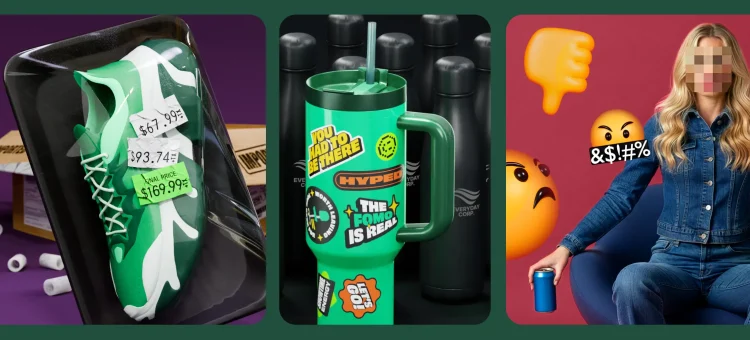In a week dominated by news surrounding a violent weekend in Charlottesville, Virginia, 40 percent of Americans approve of the way Donald Trump is handling his job as President, according to the latest SurveyMonkey Tracking poll.
For the full week, from Friday August 11 through Thursday August 17, Trump’s overall approval rating dropped a point, while 58 percent disapprove, a point higher than the previous week. These latest results match the average for SurveyMonkey’s tracking over the past four weeks, in which Trump’s approval rating has varied between 39 and 41 percent and his disapproval varied between 57 and 59 percent.
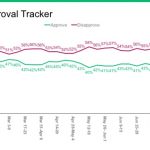
When we break out results within the week, however, we see a potentially more dramatic change. In 9,546 interviews conducted between Thursday August 11 through Tuesday August 15, Trump’s approval registered at 42 percent, but then dropped five points to 37 percent in 5,259 interviews conducted on Wednesday and Thursday.
On Tuesday afternoon, Trump held a press conference in which he reverted to blaming “both sides” for the violence in Charlottesville, and event that drew heavy news coverage. The approval downturn appears to follow news about Trump’s comments.
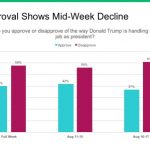
But there’s a complication: Our interviews on Wednesday and Thursday also included slightly fewer Republicans and slightly more Democrats than interviews conducted earlier in the 7-day field period.
Earlier in the week 30 percent of our respondents self-identified as Democrats and 28 percent as Republicans. On Wednesday and Thursday, 32 percent identified as Democrats and 26 percent as Republicans. Our average result for party ID over the past 6 months falls in the middle, though it’s notable that post-press conference sample included fewer Republicans but the same percentage of Democrats as our previous average.
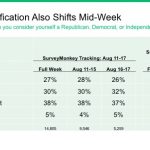
This pattern raises the possibility that something pollsters call “differential non-response” may have artificially depressed Trump’s numbers for the past two days.
Perhaps, in the immediate aftermath of heavy news coverage of Trump’s remarks – which included criticism from many prominent Republicans – some Trump supporters felt uncomfortable answering questions about him and the Charlottesville controversy and thus opted out of completing our survey. Note that the interviews SurveyMonkey conducted on Thursday included a series of questions on Charlottesville and issues of racial division (more on that below).
However, a deeper dive into our data shows that a lower response rate among Republicans than Democrats, alone, cannot explain the decline for Trump over the past two days. Specifically, during the past week, we see declines in Trump’s approval among Republicans, (from 86 to 83 percent), independents who lean Republican (from 85 to 77 percent) and independents who lean to neither party (from 34 to 27 percent).
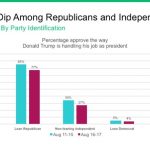
Even if we were to statistically adjust the sample by party identification, as some pollsters and analysts advocate, so both the Friday-to-Tuesday and Wednesday-Thursday interviews have exactly the same party ID composition, we would see a three point decline in Trump’s approval rating (from 41 to 38 percent).
Elsewhere in the survey, we see other evidence of the impact on public opinion from the news from Charlottesville. First, nearly eight in ten Americans interviewed on Thursday (79 percent) tell us that they have been following news about the violence in Charlottesville at least somewhat closely (37 percent very closely) with little difference across partisan groups.
Second, when asked to name the issue that matters most, the percentage volunteering a specific “other” issue jumped from 7 the previous week to 11 percent Friday through Tuesday, then again to 13 percent on Wednesday and Thursday this week. Topic modeling of the open-end responses found comments about race and racism emerging as the most prevalent topic over the past week.
Whatever the precise change – a downturn in approval, a lower response rate among Republicans than Democrats, perhaps even some shifting in self-reported partisanship – there is little question that Trump’s response to Charlottesville has provoked a real shift in our measurement of public opinion.
The bigger and harder to answer question is whether these shifts are just momentary or whether they will persist. Even if real, rising doubts about Trump seen in past few days could fade as time passes and the news moves on.
**
As first reported by Axios, interviews conducted by SurveyMonkey on Thursday show remarkable partisan division in reaction to the violence in Charlottesville and President Trump’s controversial comments about it.
First, some points of unity:
Nearly all (85 percent), including 79 percent of Republicans and 90 percent of Democrats, say President Trump “has a responsibility to condemn incidents of racial harassment that occur in the United States.”
Three-quarters (75 percent) also agree that the country is “more divided today than ever before,” with nearly half (48 percent) convinced “these divisions are likely to continue into the future.” Just 28 percent see the division but are optimistic that “Americans will come together in the near future.”
Democrats and Republicans are about equally likely to perceive America as “more divided today than ever before,” though Democrats are more likely to be pessimistic about future division (54 percent think “these divisions are likely to continue”) than Republicans (40 percent of whom think “Americans will come together”).
But partisan agreement largely ends there.
When presented a verbatim quote of President Trump's comments on Tuesday, which attributed blame to both sides -- "you had a group on one side that was bad, and you had a group on the other side that was also very violent" -- more disagree (53 percent) than agree (43 percent). Yet partisans divide: Republicans overwhelmingly support their President (87 percent agree, 11 percent disagree), while Democrats overwhelmingly dissent (15 percent agree, 83 percent disagree). Independents also differ, but by a lesser margin (39 percent agree, 59 percent disagree).
Slightly more than half (52 percent) of Americans say Trump's "responses to events like Charlottesville" do more to encourage racist acts, while 36 percent say they make no difference and 10 percent say they reduce racist acts.
Again, partisans divide: Three out of four Democrats (76 percent) say Trump's responses encourage racist acts, while 63 percent of Republicans say they make no difference and another 22 percent of Republicans say Trump’s comments reduce acts of racism.
Who was most responsible for the violence in Charlottesville? Far more blame "the far right groups" (46 percent) than "the counter-protesters" (9 percent), but a remarkable 40 percent concur with Trump's assertion that both were equally responsible.
Beneath the surface we see the same partisan division: Two-thirds of Democrats (66 percent) blame the far-right groups rather than the counter-protesters (6 percent), while Republicans overwhelmingly blame both sides equally (64 percent). About the same proportion of Republicans blame the far-right groups (18 percent) as the counter-protestors (17 percent) for the violence in Charlottesville.
Not surprisingly, partisans also differ on whether “incidents of racial harassment” have become more or less frequent since Trump’s election win in 2016. Most Democrats (83 percent) and independents (66 percent) say they have become more frequent, but only 29 percent of Republicans say the same. Overall, 61 percent say racial harassment is on the rise, 7 percent say it is less frequent and 30 percent see not much of a difference since November 2016.
Results from previous weeks can be accessed here.
Methodology: This SurveyMonkey Tracking poll was conducted online August 11 through August 17, 2017 among a national sample of 14,805 adults ages 18 and up. Respondents for this survey were selected from the nearly 3 million people who take surveys on the SurveyMonkey platform each day. Data for this week have been weighted for age, race, sex, education, and geography using the Census Bureau’s American Community Survey to reflect the demographic composition of the United States. The modeled error estimate for this survey is plus or minus 1.5 percentage points.
The Charlottesville reaction survey was conducted online on August 17 among 2,181 adults ages 18 and up using the same sampling and weighting procedures. The modeled error estimate for this survey is plus or minus 3.5 percentage points.


